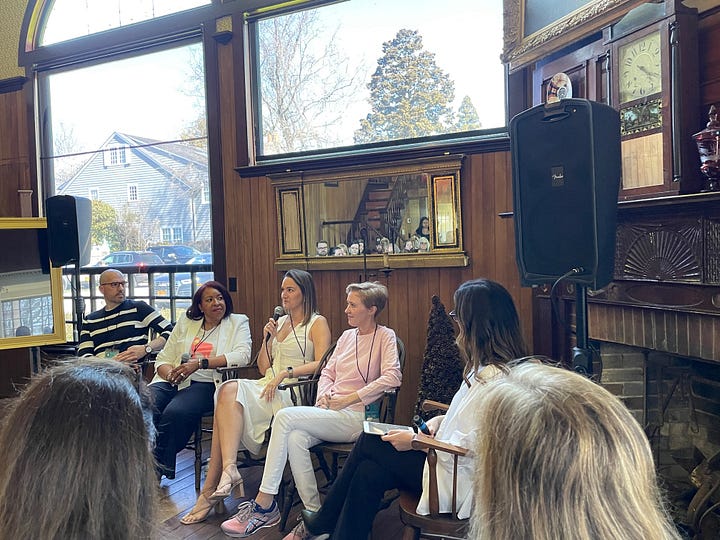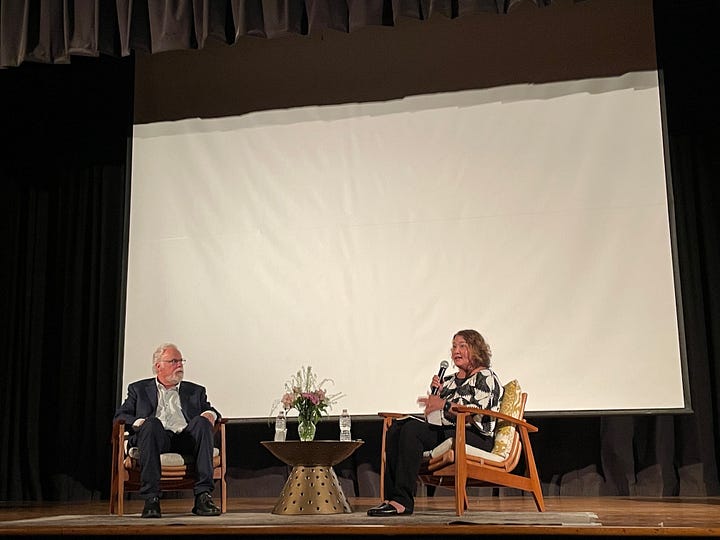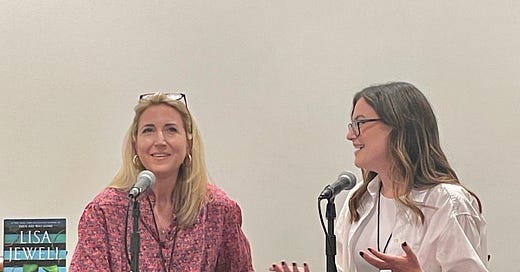Hamptons Whodunit: A new East Coast mystery and crime conference
Guest blogger Shana Wilson brings us a report from the April conference's star-packed premiere, including thoughts on reveals vs. twists, character vs. plot, bad guys and darkness, book recs and more.
As one of the least spontaneous people you’ll ever meet, I recently did something wholly out of character, all in the name of writing. When I woke up on a Monday in March and saw an Instagram post about the inaugural Hamptons Whodunit Festival in April, featuring Lisa Jewell as a guest of honor, I bought a ticket and booked a flight within three hours. Long before I tried my hand at this novel writing thing, Lisa had become an auto-buy author for me. Then She Was Gone is the book that really turned me onto the thriller/suspense genre. As a London-based author, Lisa rarely comes to the U.S. So, the fact that she would be in East Hampton – a picturesque town I’d never visited except through episodes of Barefoot Contessa – was enough to spark my interest. Once I read a little further and saw the rest of the all-star author lineup, I was whipping out my credit card. And by the time I had combed through the schedule of events, featuring not only dozens of author panels and book signings, but also what felt like an unprecedented level of access, my confirmation emails were sitting in my inbox.
Over the course of three days, I met fellow readers, writers, bookstagrammers, bookstore owners and of course, authors. I made new friends and took pages and pages of notes as I listened to the likes of Lisa Jewell, Alafair Burke, Anthony Horowitz, Michael Connelly, A.J. Finn, John Searles, Riley Sager, Stacy Willingham, Greer Hendricks, Clare Mackintosh, Liz Nugent, Wanda Morris, Megan Abbott, Nita Prose, Alison Gaylin, Kellye Garrett and so many more… and that’s just the fiction list! There was also an incredible lineup of True Crime and Nonfiction authors who were equally as compelling.
Many of the panels were moderated either by authors themselves, or by Abby Endler of @CrimebytheBook Instagram fame, who expertly guided the conversations.




So, let’s dive into some of the key nuggets and takeaways. The first panel of the festival, entitled “Deep in the Dark,” featured Riley Sager, Liz Nugent, Stacy Willingham and Wanda Morris examining darkness in the genre, giving their own unique takes.
What does darkness mean to you?
· Riley Sager: “False identities or pretending to be someone they’re not…grief and its fallout…surviving something horrible…things you don’t want to think about.”
· Wanda Morris: “People who look and act like you and I but who do horrific things to one another…People who otherwise are nice and kind.”
· Stacy Willingham: “The places your own mind can go…Violence of thoughts and emotions you can’t control…The idea of ‘if you can’t trust yourself, who can you trust?’… Paranoia/anxiety.”
· Liz Nugent: “Generational trauma – when bad things happen in childhood and how it affects you and the rest of your life. The dark places in the mind that are the result of trauma.”
At one point during all of the musings on darkness, Abby Endler observed, “The darker the story, the nicer the author.” The panelists all agreed there’s something about getting darkness out on the page that creates a lightness or freedom in other areas of life.
Lisa Jewell tackled similar questions in her featured panel entitled “Dark Secrets, Twisted Families.” When asked why so many of her books are about families, Lisa joked about being lazy and claimed a reluctance to research, “we’re all in families and we all know what it’s like.” But, she also pointed out that something else she returns to frequently in her books is houses: “I like writing about the other side of the front door… what happens inside people’s houses. Because you’re a completely different person behind the door of your house to the person you are when you’re outside, and that’s what I like writing about.”
Of course, there were questions about process, and the plotters, pantsers and plantsers all marveled at how the other does what they do. Authors ran the gamut from ultimate pantser Lisa Jewell to Clare Mackintosh, who plots her books with “forensic detail,” including planning and tracking the reader’s journey through every chapter.
Despite the vastly different ways they go about telling their stories, the outcomes are equally successful, producing gripping stories with well-developed characters and that page-turning quality. Clare may carefully map out what she wants the reader to feel and think chapter by chapter, but even without planning, Lisa is also intentional about creating an unputdownable reading experience. Here’s how she does it:
“It is deliberate, because I can feel when it’s getting boring. I can feel it and I know that something needs to happen. Quite often I’ll just make anything happen, or suggest that something might be about to happen. Somebody’s going through somebody’s jacket pocket looking for something and I don’t know what it is but I’ll get them to find something and then I’ll worry later about what the thing is that they found in the jacket pocket. Things have to keep happening all the time, and also things have to be held back all the time…There has to be a really good energy between the end of one chapter and the beginning of the next. That’s the evil plan.”
A huge part of creating that page-turning experience is character building, and character was a dominant topic across most panels, especially “The Good, The Bad and the Ugly – Crafting Complex Characters,” featuring Lisa Jewell, Nita Prose, Alison Gaylin, Clare Mackintosh and Liz Nugent.
What comes first: character or plot?
· Nita Prose: “Molly (the maid) came in a burst. I heard a very precise voice in my head and started writing that voice on a plane.”
· Lisa Jewell: “Character first. Plot is everything, but inhabiting characters who fascinate you, surprise you, who grow on the page as you’re writing them – that’s what makes writing and hopefully reading pleasurable.”
· Liz Nugent: “When your characters make bad decisions, that’s when you get your plot. My books start with one line, then I wonder who said it.”
· Alison Gaylin: “Character drives plot. But what tends to hit me first is an idea ‘What would I do if that were me?’ I can write a book about that. Character comes from the idea.”
· Clare Mackintosh: “Plot/concept first. ‘What would happen if’…. Then I decide what people I want to put in that situation.”
What’s it like to write the ‘bad guy’?
· Lisa Jewell: “I like writing creepy people. Not necessarily out and out evil, psycho, murderous people, but characters who put people on edge. They say strange things.”
· Liz Nugent: “I write the dastardly characters, but then I go back in time and look at their childhoods to see what made them that way.”
· Alison Gaylin: “The scariest thing is our own capacity to do the wrong thing – one bad thing and then another to cover it up. No one sees themselves as the villain. Everyone is the hero of their own story.”
· Clare Mackintosh: “First drafts are often about discovering who the characters really are. I might think I know them, but then I have to go back and make changes after I know them. I don’t always let characters do what they want to do because I’m a control freak.”
On the topic of how to balance character development with pacing in a way that keeps things moving while also getting readers invested, Clare Mackintosh had my favorite line of the day: “Write the fast scenes slowly and the slow scenes fast.”
Another defining element of the genre is the element of surprise. Panelists Clare Mackintosh, John Searles, Stacy Willingham and Greer Hendricks talked about the pressure to deliver a jaw-dropping twist when writing thrillers in “Plot Twists vs. Murder Mysteries: Telling Gripping Crime Stories.”
What makes a great plot twist?
· John Searles: “Readers love surprises but they hate coincidence.”
· Greer Henricks: “It has to feel well-earned, like it makes sense.”
· Stacy Willingham: “Earned. Need to work on clue placement in the beginning, making things not convenient.”
· Clare Mackintosh: “I want a twist to be a twist and not a reveal.”
On Clare’s point, the difference was discussed as follows: a reveal is the answer to a question we’ve all been asking, while a twist is the answer to a question we never thought to ask.
For Stacy, “a twist is something that changes everything you thought you knew up to that point.”
Land mines to watch out for when writing a twist:
· Greer Hendricks: “You have to be careful with a twist vs. a trick.”
· John Searles: “You want to lay enough clues so the twist makes sense looking back, but if you put in too much, readers will figure it out.”
· Stacy Willingham: “When writing an unreliable narrator, you need to be very careful about the way they speak and the clues they drop, so when the twist is revealed, the reader doesn’t feel lied to. As a reader, I don’t like to be lied to, but I don’t mind being deceived.”
There were so many valuable nuggets from the festival that the above only scratches the surface. Even after being hit with a stomach bug on the final day that took me down for a full week, I came away from the trip feeling grateful, with a renewed sense of inspiration to tackle revisions that I have been avoiding for the past four months. I haven’t done anything about it yet… but I’ll take the spark!
Because I always love to know what people are reading and watching, I’ll leave you with some recommendations.
Lisa Jewell recommends the UK detective show Unforgotten. Every season starts with the discovery of human remains and then unfolds from there (if you’ve read Lisa’s latest, The Family Remains, you know one storyline revolves around a bag of bones). I found the series on Amazon Prime and binged the first season in two days. The storytelling and character development (as well as the acting) are truly masterful.
Author/moderator-recommended stories (book/movie) with favorite twists:
Clare Mackintosh: Before I Go to Sleep
John Searles: The Wife Between Us
Stacy Willingham: Sharp Objects
Greer Hendricks: Before I Go to Sleep
Abby Endler: The Sixth Sense
I really enjoyed the twist in The Wife Between Us, and I guess I need to read Before I Go to Sleep!
For good measure, my favorite twists can be found in Goodnight Beautiful by Aimee Molloy (midpoint twist), The Silent Patient by Alex Michaelides and Invisible Girl by Lisa Jewell (both ending twists). I am someone who doesn’t mind a final page twist that leaves things open-ended, hinting at something but letting the reader draw their own conclusions (when it’s done well… as we’ve heard, it has to be earned!).
Shana Wilson is a senior communications executive, having spent most of her career in the sports industry. After growing up in the San Diego suburbs, she graduated from UCLA with a bachelor’s degree in English and from the Medill School of Journalism at Northwestern University with a master’s degree in journalism. When she’s not writing adult suspense or watching true crime documentaries to inspire her writing, she can be found reading, baking, sipping wine with friends, or walking her dog at the beach. She lives in San Diego with her Cockapoo, Ollie. Find her on Instagram @shanawilsonauthor.



I must go to this next year.
Shana, I loved this report so much. I've never read a conference report before but now I've read yours twice. So many pieces are just speaking directly to my soul right now. And I've never heard that distinction between a reveal & a twist -- it's so good.